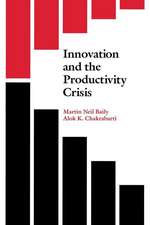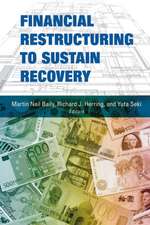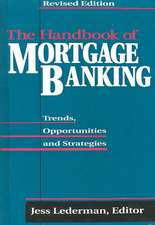The Future of Housing Finance: Restructuring the U.S. Residential Mortgage Market
Editat de Martin Neil Bailyen Limba Engleză Paperback – 7 oct 2011
Fannie Mae and Freddie Mac, government-sponsored enterprises that played a prominent role in the financial crisis of 2008, and the federal government have come to a crossroads. The government must make key decisions about their structure, and indeed, their very existence.
The government has played an important role in the American housing market since the early 1930s, when the Great Depression ushered in housing programs to promote a stable society. The government's role expanded further during the recent housing and financial crisis—Fannie Mae and Freddie Mac now dominate the American housing market, backing more than 62 percent of new mortgages and holding more than $5 trillion in accumulated mortgage risk.
In The Future of Housing Finance Martin Baily and his associates discuss the issues and options that policymakers face as they reassess the government's role in the U.S. residential mortgage market. While presenting diverse analytical perspectives, including a contribution from former chairman of the Federal Reserve Alan Greenspan, all contributors agree that the government's support for mortgage financing in the recent past was too broad and deep but some role is necessary to maintain the stability of the housing finance market. The Obama administration has recommended reducing the role of Fannie and Freddie while replacing them with a private market approach, but continuing federal support for worthy borrowers. But what will Congress agree to? And how fast will it move on any initiative?
Specific topics include:
• Introduction of a new system to reduce incentives that encourage excessive risk taking.
• Gradual withdrawal of Fannie and Freddie from the housing finance system.
• New approaches to regulating mortgage securitization, with financial stability as a primary goal.
• Use of government-backed guarantees through institutional structures designed to limit moral hazard.
The government has played an important role in the American housing market since the early 1930s, when the Great Depression ushered in housing programs to promote a stable society. The government's role expanded further during the recent housing and financial crisis—Fannie Mae and Freddie Mac now dominate the American housing market, backing more than 62 percent of new mortgages and holding more than $5 trillion in accumulated mortgage risk.
In The Future of Housing Finance Martin Baily and his associates discuss the issues and options that policymakers face as they reassess the government's role in the U.S. residential mortgage market. While presenting diverse analytical perspectives, including a contribution from former chairman of the Federal Reserve Alan Greenspan, all contributors agree that the government's support for mortgage financing in the recent past was too broad and deep but some role is necessary to maintain the stability of the housing finance market. The Obama administration has recommended reducing the role of Fannie and Freddie while replacing them with a private market approach, but continuing federal support for worthy borrowers. But what will Congress agree to? And how fast will it move on any initiative?
Specific topics include:
• Introduction of a new system to reduce incentives that encourage excessive risk taking.
• Gradual withdrawal of Fannie and Freddie from the housing finance system.
• New approaches to regulating mortgage securitization, with financial stability as a primary goal.
• Use of government-backed guarantees through institutional structures designed to limit moral hazard.
Preț: 279.14 lei
Nou
Puncte Express: 419
Preț estimativ în valută:
53.43€ • 58.06$ • 44.91£
53.43€ • 58.06$ • 44.91£
Carte tipărită la comandă
Livrare economică 21 aprilie-05 mai
Preluare comenzi: 021 569.72.76
Specificații
ISBN-13: 9780815722083
ISBN-10: 0815722087
Pagini: 212
Ilustrații: Illustrations
Dimensiuni: 152 x 229 x 18 mm
Greutate: 0.32 kg
Editura: Brookings Institution Press
Colecția Brookings Institution Press
ISBN-10: 0815722087
Pagini: 212
Ilustrații: Illustrations
Dimensiuni: 152 x 229 x 18 mm
Greutate: 0.32 kg
Editura: Brookings Institution Press
Colecția Brookings Institution Press
Notă biografică
Martin Neil Baily is the Bernard L. Schwartz Chair in Economic Policy Development and a senior fellow and the director of the Initiative on Business and Public Policy in the Economic Studies program at the Brookings Institution. He was chairman of the Council of Economic Advisers during the Clinton administration (1999–2001) and one of three members of the council from 1994 to 1996.
Descriere
Fannie Mae and Freddie Mac, government-sponsored enterprises that played a prominent role in the financial crisis of 2008, and the federal government have come to a crossroads. The government must make key decisions about their structure, and indeed, their very existence.
The government has played an important role in the American housing market since the early 1930s, when the Great Depression ushered in housing programs to promote a stable society. The government's role expanded further during the recent housing and financial crisis—Fannie Mae and Freddie Mac now dominate the American housing market, backing more than 62 percent of new mortgages and holding more than $5 trillion in accumulated mortgage risk.
In The Future of Housing Finance Martin Baily and his associates discuss the issues and options that policymakers face as they reassess the government's role in the U.S. residential mortgage market. While presenting diverse analytical perspectives, including a contribution from former chairman of the Federal Reserve Alan Greenspan, all contributors agree that the government's support for mortgage financing in the recent past was too broad and deep but some role is necessary to maintain the stability of the housing finance market. The Obama administration has recommended reducing the role of Fannie and Freddie while replacing them with a private market approach, but continuing federal support for worthy borrowers. But what will Congress agree to? And how fast will it move on any initiative?
Specific topics include:
• Introduction of a new system to reduce incentives that encourage excessive risk taking.
• Gradual withdrawal of Fannie and Freddie from the housing finance system.
• New approaches to regulating mortgage securitization, with financial stability as a primary goal.
• Use of government-backed guarantees through institutional structures designed to limit moral hazard.
The government has played an important role in the American housing market since the early 1930s, when the Great Depression ushered in housing programs to promote a stable society. The government's role expanded further during the recent housing and financial crisis—Fannie Mae and Freddie Mac now dominate the American housing market, backing more than 62 percent of new mortgages and holding more than $5 trillion in accumulated mortgage risk.
In The Future of Housing Finance Martin Baily and his associates discuss the issues and options that policymakers face as they reassess the government's role in the U.S. residential mortgage market. While presenting diverse analytical perspectives, including a contribution from former chairman of the Federal Reserve Alan Greenspan, all contributors agree that the government's support for mortgage financing in the recent past was too broad and deep but some role is necessary to maintain the stability of the housing finance market. The Obama administration has recommended reducing the role of Fannie and Freddie while replacing them with a private market approach, but continuing federal support for worthy borrowers. But what will Congress agree to? And how fast will it move on any initiative?
Specific topics include:
• Introduction of a new system to reduce incentives that encourage excessive risk taking.
• Gradual withdrawal of Fannie and Freddie from the housing finance system.
• New approaches to regulating mortgage securitization, with financial stability as a primary goal.
• Use of government-backed guarantees through institutional structures designed to limit moral hazard.















